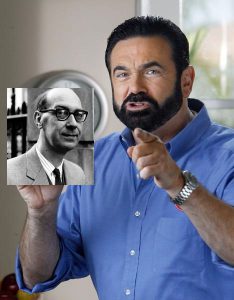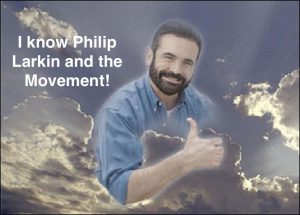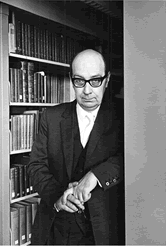Hi! Billy Mays here for the Movement! The nonconformist specialist! You might remember me from my OxiClean and Kaboom commercials back in the day! Today, I’ve decided to come back from the salesman grave and introduce you to a poetry movement that might peek your interest. Listen up! Are you tired of the open form and free verse style of Modernist poetry? Did T.S Eliot’s The Waste Land make you want to fall asleep or even start your own poetry movement? Does the emphasis on emotion and self-expression in Romantic poetry make you sick? Do you want to go back to traditional structured poetry? Don’t worry! The Movement is here for you! If you love cool, clear, analytical, scientific poetry that shook up and changed British poetry during the 1950s, The Movement is a MUST. It is by far the best poetry movement guaranteed! Shipping and handling doesn’t even apply. Now that I’ve got your attention, let’s take a deeper look at the movement poets and why you’ll love this rebellious movement.

The poets within the Movement included Kingsley Amis, Elizabeth Jennings, Donald Davie, Robert Conquest, Thom Gunn, D.J. Enright, John Holloway, John Wain and more importantly Philip Larkin! Did you read that right folks? The PHILIP LARKIN! As a member of the dead salesman society, I’m right next to the dead poets society! I hangout with these guys all the time. So trust me I know Philip Larkin! But before we talk about the amazing Larky, allow me to discuss what the Movement was really about.
The Movement was not in fact a coherent literary group… stay with me on this! Instead it was a loosely tied group of poets who saw themselves as individuals that shared a common objective against Modernism and Romanticism. Specifically they wanted to demonstrate the significance of English poetry against the relatively new Modernist poetry. Wow! They were too cool for school! Blake Morrison, a trusted critic of the Movement, indepthly explains that the poets hated the social snobbiness of Modernism, refused to accept the ideas of Modernists for political reasons and thought that Modernism dismissed the contract between the poet and audience. The group felt that the earlier generations of poets lacked realistic ideas of the self and of the world. Unlike Modernism, the Movement poets wanted clarity in writing, where the poet focused on precision rather than obscurity. Poetry just got way EASIER! I know what you are thinking! Billy, you’ve told me facts about the Movement objectives and what the poets disliked about Modernism, but show me some POETRY! Woah blog reader! Slow it down! Here is a section of T.S. Eliot’s The Waste Land that shows what Movement poets loathed:
If there were water
And no rock
If there were rock
And also water
And water
A spring
A pool among the rock
If there were the sound of water only
Not the cicada
And dry grass singing
But sound of water over a rock
Where the hermit-thrush sings in the pine trees
Drip drop drip drop drop drop drop
But there is no water.
This poem section and many other Modernist poetry stayed away from traditional verse and instead used a wide range of metric patterns close to free verse. A Movement poet would see this section as obscure, non-traditional and non-academic. Who wants to read this? See what I mean? Drip drop drip drop drop drop drop… Boring! You want cool, clear, traditional poetry that fits your nonconformist needs? Let’s check out the most popular Movement poet Philip Larkin!
How bout a little taste from Larkin’s Church Going:
Once I am sure there’s nothing going on
I step inside, letting the door thud shut.
Another church: matting, seats, and stone,
And little books; sprawlings of flowers, cut
For Sunday, brownish now; some brass and stuff
Up at the holy end; the small neat organ;
And a tense, musty, unignorable silence,
Brewed God knows how long. Hatless, I take off
My cycle-clips in awkward reverence.
Move forward, run my hand around the font.
From where I stand, the roof looks almost new –
Cleaned, or restored? Someone would know: I don’t.
Mounting the lectern, I peruse a few
Hectoring large-scale verses, and pronounce
‘Here endeth’ much more loudly than I’d meant.
The echoes snigger briefly. Back at the door
I sign the book, donate an Irish sixpence,
Reflect the place was not worth stopping for.
Yet stop I did: in fact I often do,
And always end much at a loss like this,
Wondering what to look for; wondering, too,
When churches will fall completely out of use
What we shall turn them into, if we shall keep
A few cathedrals chronically on show,
Their parchment, plate and pyx in locked cases,
And let the rest rent-free to rain and sheep.
Shall we avoid them as unlucky places?
Wow! Weren’t you on the edge of your seat wanting more? I know I was! Church Going utilizes every characteristic within the Movement and more! The poem has traditional iambic structure, it is clear and precise, and it has a realistic idea of the self (speaker) and the world. This poem specifically explains the persistence of the English Church and an English poetic tradition. Because of this poem and other Larkin poems like Deceptions and Whitsun Weddings, he became the most popular Movement poet. Why you might ask? But wait! There’s more! Larkin’s poetry went beyond some basic Movement characteristics. He was more expansive and wide ranging than the other poets. His poetry demonstrates a profound imaginative grasp of social experience and also shows how he has a greater span of literary devices. By doing this, Larkin helped shake up the norms of British poetry during 1950s and paved a way for future poets! Has this moved you closer to the Movement? I sure hope it has! Hey if you read one today, we will deliver three tomorrow! Don’t miss this deal! For the first 40 readers, there will no payment required! Thanks for reading!
By Zak Morris
“ART OF EUROPE.” Larkin – Church Going. N.p., n.d. Web. 13 Feb. 2017.
Eliot, T.S. “The Waste Land by T. S. Eliot | Poetry Foundation.” Poetry Foundation. Poetry Foundation, n.d. Web. 13 Feb. 2017.
Lewis, Pericles. “The Waste Land.” The Waste Land – Modernism Lab Essays. Yale University, n.d. Web. 13 Feb. 2017.
Marcus, Laura, and Peter Nicholls. The Cambridge History Of Twentieth-Century English Literature. n.p.: Cambridge, UK ; New York : Cambridge University Press, 2004., 2004. U of Georgia Catalog. Web. 12 Feb. 2017.
Naeem, Muhammad. “Philip Larkin and The Movement.” Learn English, IELTS, EFL,ESL Public Speaking, Grammar, Literature, Linguistics by NEO. Neo, 2 Dec. 2010. Web. 13 Feb. 2017.
“Philip Larkin.” Poetry Foundation. Poetry Foundation, n.d. Web. 13 Feb. 2017.
Racz, Istvan D. “Larkin and the Movement in Two New Books.” Hungarian Journal of English and American Studies (HJEAS), vol. 18, no. 1/2, 2012, pp.545-558. Web. 13 Feb. 2017.
“The Movement (literature).” Wikipedia. Wikimedia Foundation, n.d. Web. 13 Feb. 2017.



